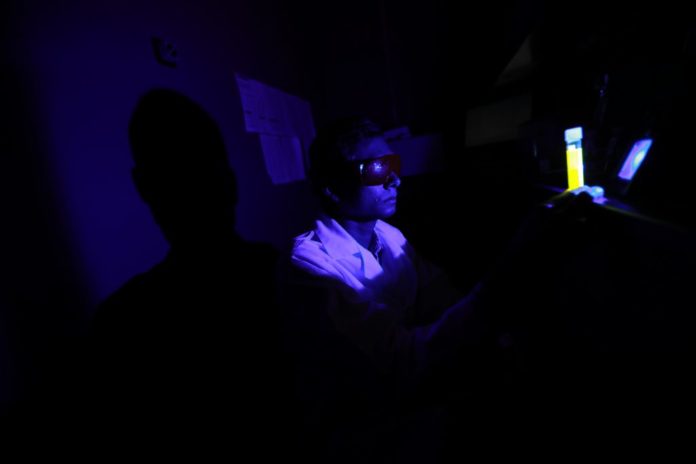We are being exposed to blue light continuously, and the eye’s cornea and lens cannot block or reflect it. It’s a dependable fact that blue light damages our vision by harming the eye’s retina.
In a new study, scientists at The University of Toledo discovered that how this blue light damages our retina. The study suggests that blue light from digital devices and the sun transforms vital molecules in the eye’s retina into cell killers.
Dr. Ajith Karunarathne, assistant professor in the UT Department of Chemistry and Biochemistry said, “Our experiments explain how this happens, and we hope this leads to therapies that slow macular degeneration, such as a new kind of eye drop.”
Scientists discovered that blue light introduction makes retinal trigger responses that create toxic synthetic molecules in photoreceptor cells.
Kasun Ratnayake, a Ph.D. student researcher working in Karunarathne’s cellular photochemistry group said, “It’s toxic. If you shine a blue light on the retina, the retinal kills photoreceptor cells as the signaling molecule on the membrane dissolves. Photoreceptor cells do not regenerate in the eye. When they’re dead, they’re dead for good.”
Scientists introduced retinal particles to other cell composes in the body, for example, cancer cells, heart cells, and neurons. At the point when presented to blue light, these cell types died because of the blend with retinal. Blue light alone or retinal without blue light had no impact on cells.
Karunarathne said, “No activity is sparked with green, yellow or red light. The retinal-generated toxicity by blue light is universal. It can kill any cell type.”
The study suggests that a molecule called alpha tocoferol, a Vitamin E derivative and a natural antioxidant in the eye and body, stops the cells from dying. However, as a person ages or the immune system is suppressed, people lose the ability to fight against the attack by retinal and blue light. That is when the real damage occurs.
Dr. John Payton, visiting the assistant professor in the UT Department of Chemistry and Biochemistry, said, “If you look at the amount of light coming out of your cell phone, it’s not great but it seems tolerable. Some cell phone companies are adding blue-light filters to the screens, and I think that is a good idea.”
The process outlined in the study, which was recently published in the journal Scientific Reports.
